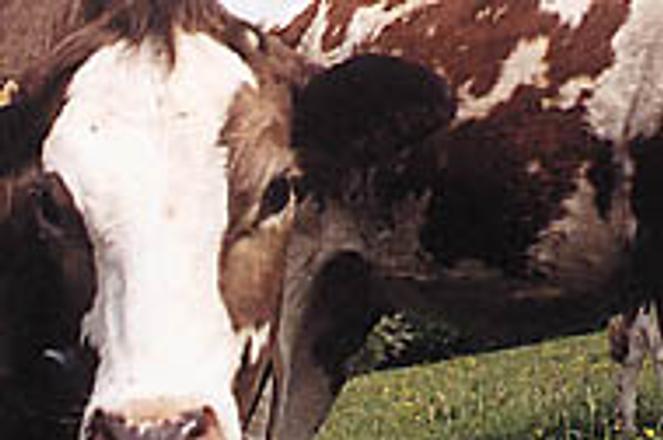So far, BSE has not hit Slovakia, but the government is taking no chances and has announced new controls and tests on cattle.photo: Ján Svrček
Slovak authorities imposed a blanket ban on the import and transit of cattle, beef, and beef embryo products from the Czech Republic after officials in Prague June 8 confirmed the first case of BSE (Bovine Spongiform Encephalopathy) disease outside western Europe.
The Slovak move was in line with similar bans on imports of Czech meat products by many EU states following the news from Prague.
A ban was also put on the distribution and sale of all Czech foodstuffs containing bovine products in Slovakia. Inspections of retail outlets selling or storing foodstuffs, as well as of school and hospital canteens, were also ordered.
The costs of taking these extra measures against the spread of the cattle disease, which many scientists believe could be connected to a new variant of the human brain-wasting condition, Creutzfeldt-Jakob Disease (CJD), were set at 700 million crowns ($1.4 million) by the Agriculture Ministry June 12.
Ministry counter-measures will include the testing of cattle for BSE, the construction of a new carcass disposal plant in central Slovakia's Zvolen, and the use of an existing carcass disposal plant in Nitra to destroy any cattle discovered to be infected.
Measures against the disease have been in place in Slovakia since 1996. Nearly 6,000 head of cattle which had been imported from countries thought to be free of BSE, but which have since reported cases of the disease, are being tested in Slovakia. No positive cases have yet been found.
Fears confirmed
The discovery of BSE in the Czech Republic has confirmed EU fears that the disease might have spread to central and eastern Europe. EU bodies had warned in an official report in April there was a significant risk that BSE, which was first identified in the UK in the late 1980s, was lurking in central European cattle herds.
The disease has been devastating for some cattle farmers in EU states. Following its identification in Britain and other EU countries, and the subsequent discovery of a possible link between BSE and variant CJD in the early 90s, beef exports from the union dropped by between 30% and 70%.
Signs like this one advertising 'Slovak-only' beef for sale are on the rise.photo: TASR
However, each test costs 2,300 crowns, and more than 12,000 head of cattle which have been imported from the Czech Republic since 1993 will now have to be examined, the Agriculture Ministry said.
Slovak Agriculture Ministry officials have previously said that if a case were to be confirmed here it could be devastating to the domestic meat industry. Some farmers have already reported drops in sales of beef of 30% over the last year, even before the disease was discovered in the Czech Republic, as public anxiety over the possible health risks of eating beef contaminated with BSE have grown.
While Slovak farmers say that they have been following strict measures in farms and slaughterhouses to prevent their cattle from developing the animal sickness, they may face financial problems even if there are no positive tests for BSE. Some Slovak slaughterhouses have already said they will stop slaughtering cattle, the costs of equipping slaughterhouses to meet new measures against the disease being too high.
The Slovak Chamber of Agriculture and Food has estimated the cost of equipping one slaughterhouse to meet stricter standards at between 2 million and 2.5 million crowns, with an additional cost of between 1.5 and 3 crowns for each kilogramme of livestock liquidated.
It has warned that if farmers and meat producers are forced to bear this burden, they could face huge losses.


